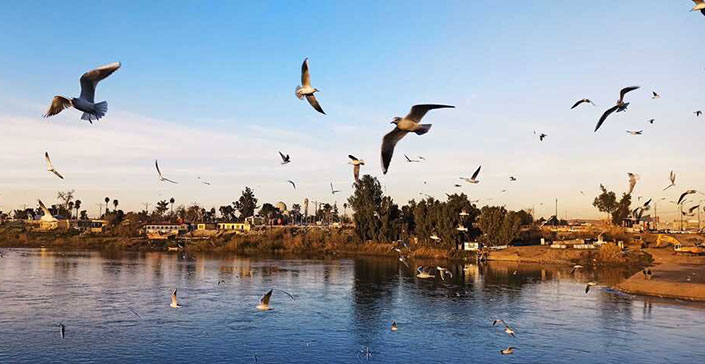Biology Class Joins Global Solutions Sustainability Challenge
03/10/2021

Moreno Valley College's Biology 61 class (Introduction to Organismal and Population), consisting of 38 students, is the latest group to join the IREX Global Solutions Sustainability Challenge. The Biology 61 class connects students in the Moreno Valley with two universities in Iraq to virtually collaborate on examining water resources and creating sustainable solutions to water's scarcity.
Bi-national teams engage to create a sustainable business solution to a challenge identified by industry partners across business sectors. Throughout the challenge participants develop workforce skills, network with industry professionals, and participate in a virtual career fair. At the conclusion of the challenge, the teams will submit a video pitch and business plan for their prototype to the Virtual Global Business Expo where the top three finalists will be selected by an advisory committee comprised of industry professionals and educators.
IREX is a nonprofit organization committed to global development and education. IREX works with partners in more than 100 countries in four areas essential to progress — empowering youth, cultivating leaders, strengthening institutions, and extending access to quality education and information.
The program, Global Solutions Challenge, is built upon a curriculum for a virtual exchange conversation on sustainability, design thinking and cross-cultural communication. The purpose of the program is to provide a unique virtual exchange experience for students to practice empathy and cross-cultural communication skills as they learn about design thinking and ideate a sustainable solution to a real problem in the community. It is funded by the Stevens Initiative, which is sponsored by the US Department of State, with funding provided by the US government and is administered by the Aspen Institute.
The Biology 61 class was split into two teams with each working with a different university, located 7,500 miles away from Moreno Valley. One team is collaborating with the University of Mosul in Iraq, while a second group seeks solutions with students from Soran University in Iraqui, Kurdistan. Each is focusing on environmental issues.
“I saw the Challenge as a window to the world, giving our students a chance to become entrepreneurs and providing a great opportunity to establish cross-cultural collaborations while seeking solutions to global problems," Joanna Werner-Fraczek, Ph.D., professor of Biology, said. “I strongly believe in exposing students to research conducted at other institutions on the one hand to broaden their horizons and ease the transfer to universities, and on the other hand, to contribute to the equality of transfer."
This isn't the first time Werner-Fraczek has exposed her students to such important projects. Besides an ongoing collaboration with three faculty members from UC Riverside, her students have participated in the Citizen Science project (US Ants project) sponsored by Cold Spring Harbor in 2020. And in spring 2021, the Biology 60 students will test a CRISPR - Gene Editing kit developed at the University of Wisconsin.
For this Global Solutions Sustainability Challenge, the participants meet on Slack. After a few days of introductions, the students got down to discussing their particular local water issues. Each team created a Mind Map that illustrated topics and defined a specific project to work on over the next four weeks. The significance of the challenge is that projects are 100 percent student driven from the idea to prototype. One Biology 61 team decided to work on an application to monitor everyday water usage by a household.
Werner-Fraczek said projects like this built self-confidence (through learning opportunities) and in turn students are more likely to transfer because of their enriched portfolio.
“The Challenge is an opportunity for students to learn from each other," Werner-Fraczek
said. “The Challenge gives students a global vision while connecting to their community
… they think globally but act locally."
Biology 61 Team/Individual Roles
Antonio Negrete, Laura Castillo, Rosalise Contreas, Elizabeth Fletes — App Development
Latasha Murray — Business Concept and Marketing
Laura Castillo -Title Page, Teacher/Student, University, Subject, Resource/How To Tabs
Elizabeth Fletes — Develop Tab Flow
Rosalise Contreas — Develop Program Page and External Resource Page
Marisela Gomez — Research Universities and the Subjects They Offer
Yasmin Kelada/Rosalise Contreas — Research External Programs/Develop Program Sub Tab
Pamela Gamino — Research External Resources that Could Assist Professors and Students
Karne Cordero — Develop a Business Concept for Apple and Android Application
Karina Meija Montano — Cost Development/Marketing Cost Projections
Darlene Hernandez/Virginia Banales — Develop the App Transition
Jaileen Contreras/Laura Castillo — Time and Transition Projections
Rania Mowafaq — Work with Iraq Team on Additions and Ideas on the Sub Tabs
Lisset Garcia — Manage Communicate with the Relations Manager on the Iraq Team
Leila Samra — Development for Connecting Teachers to the App
Virginia Banales — App Marketing to the General Public
Published by External Relations & Strategic Communications

